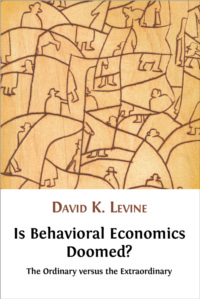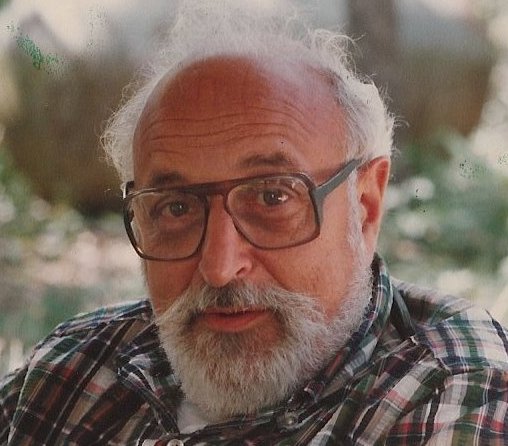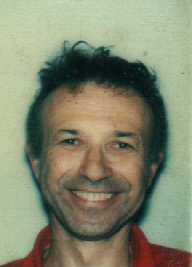
Economic
and Game Theory
General Interest News
 The Keynesian Illusion:
Explained here
[Posted at 03/15/2015 02:14 AM by David K. Levine
The Keynesian Illusion:
Explained here
[Posted at 03/15/2015 02:14 AM by David K. Levine  ]
]
 NPR on Patents:
An NPR program on patents based on an interview with Michele and me.
[Posted at 07/31/2014 04:05 AM by David K. Levine
NPR on Patents:
An NPR program on patents based on an interview with Michele and me.
[Posted at 07/31/2014 04:05 AM by David K. Levine  ]
]
 Classroom Games:
If you are a fan of classroom experiments, you should take a look at Walter Yuan's
Classroom Games:
If you are a fan of classroom experiments, you should take a look at Walter Yuan's  Walter wrote most of the software for SSEL and CASSEL and with a lot of input from top experimentalists has designed some really good classroom software.
[Posted at 04/26/2014 05:58 AM by David K. Levine
Walter wrote most of the software for SSEL and CASSEL and with a lot of input from top experimentalists has designed some really good classroom software.
[Posted at 04/26/2014 05:58 AM by David K. Levine  ]
]
 Free Online Classroom Games:
Nicolas Gruyer has a very nice site with games you can use for economics in your classroom. Take a look!
[Posted at 07/08/2013 03:44 AM by David K. Levine
Free Online Classroom Games:
Nicolas Gruyer has a very nice site with games you can use for economics in your classroom. Take a look!
[Posted at 07/08/2013 03:44 AM by David K. Levine  ]
]
 Review of Acemoglu and Robinson's Why Nations Fail:
Can we explain the world by extractive and inclusive political institutions?
[Posted at 09/30/2012 12:55 AM by David K. Levine
Review of Acemoglu and Robinson's Why Nations Fail:
Can we explain the world by extractive and inclusive political institutions?
[Posted at 09/30/2012 12:55 AM by David K. Levine  ]
]
 Is Behavioral Economics Doomed?:
Is Behavioral Economics Doomed?:

Now available everywhere From Openbook Publishers - a new open access book about traditional and behavioral economics.
[Posted at 06/20/2012 08:05 AM by David K. Levine  ]
]
 The Ordinary Versus the Extraordinary:
The Ordinary Versus the Extraordinary:

NEW: Chapter 8 and 9 posted. Chapters of a new open access book about traditional and behavioral economics.
[Posted at 02/03/2011 07:45 AM by David K. Levine  ]
]
 NSF Economics in the Future:
White papers by economists about the future of economics.
[Posted at 01/31/2011 01:03 PM by David K. Levine
NSF Economics in the Future:
White papers by economists about the future of economics.
[Posted at 01/31/2011 01:03 PM by David K. Levine  ]
]
 In Memoriam December 6, 2010 Robert A. Levine:
In Memoriam December 6, 2010 Robert A. Levine:

My father - a giant of a man and always my inspiration. For the moment you can find some information about him here. Slideshow from the memorial.
[Posted at 12/07/2010 07:15 AM by David K. Levine  ]
]
 In Memoriam July 29, 2010 Earl Thompson:
In Memoriam July 29, 2010 Earl Thompson:

Earl Thompson, economist: born October 15, 1938; Assistant Professor, Stanford University 1962-1965, Assistant Professor UCLA 1965-1969, Associate Professor, UCLA 1969-1973; Professor, Department of Economics, UCLA 1973; married 1961 Velma Montoya (one son); died Los Angeles 29 July 2010.
Thompson was an idiosyncratic but brilliant thinker, and his death marks the end of an era for UCLA: Thompson is the last of the economists brought to UCLA by Armen Alchian in the 1960s to create the famed UCLA school of economics.
Thompson's interests in economics were broad ranging. In recent years his goal was to provide an integrated theory of the vital institutions of society - a theory that tied together historical events with economic theory and politics. The basic elements of the theory were outlined in his 2001 book with Charles Hickson. The entire theory was to appear in the three volumes entitled A Reconstruction of Economics.
Thompson did not set out to be an economist. His ambition until his early twenties was to be a professional baseball player. Fortunately for us he fell to injury, so instead became an academic. He attended UCLA as an undergraduate where he studied under Armen Alchian who turned him towards economics, and while in his younger years he had been an indifferent student, he graduated with Honors in 1958. He attended the London School of Economics, then returned to Harvard for his Ph.D. under the supervision of John R. Meyer, becoming Harvard's youngest Ph.D. in Economics in 1961. His first longterm position was as an assistant professor at Stanford University. In 1965 he moved back to Los Angeles to UCLA, where he spent the bulk of his career.
Over that career Thompson published more than 40 articles, many in the top academic journals. He wrote on topics ranging from monetary theory to welfare economics. Always his focus was on the winners and losers from economic policy. In monetary theory he was profoundly skeptical of the influence of bankers on monetary policy - as we have recently been reminded, bankers look out for bankers' interests, not the interests of the rest of us. As recently as March Thompson was writing in the AmericanThinker.com explaining why the banker driven bailout and stimulus policies might benefit bankers, but would be of little use to the rest of us.
Thompson was also cognizant of the universal desire for monopoly. He was one of the first to point to collusion between unions and firms - unions are not subject to anti-trust laws. He gathered substantial evidence that in the coal industry strikes served to raise prices and increase profits by restricting output.
One of Thompson's most significant theoretical contributions was in the area of public finance. Conventional wisdom among economists is that taxing capital is a poor idea. Thompson pointed out that the national defense is one of the primary functions of government - and the beneficiaries are largely the owners of capital. Far from an inefficient drag on the economy, he argued, capital taxes are effectively a user fee, charging those that benefit the most from defense for its cost. That democratic institutions seemed to have found the right solution where economists had not made a profound impression on him.
Thompson made major theoretical contributions to the study of commitment in games - arguing that it has an empirical significance that is underplayed by economists and game theorists. In doing so, he demonstrated a formal mathematical version of what is sometimes known as the Coase Theorem: that without frictions an economy attains desirable outcomes even in the absence of competition. Where other economists focused on markets Thompson focused on the evolution of democratic political institutions, arguing that the democratic process tended to bring forth efficient policy compromises.
Thompson loved to work with students, although occasionally his classes met at odd times, such as Sunday afternoons. Many of his students became coauthors and lifelong friends.
In the early 1980s, while his wife Velma Montoya served in the Reagan White House, Thompson spent a year at the Federal Trade Commission in Washington. This gave him an opportunity to comment on and influence public policy: although a theorist Thompson had an enormously practical side and cared deeply about people and policy.
Thompson received numerous grants and awards to support his research, including from the UCLA Institute for Government and Public Affairs; the Ford Foundation; the Eli Lilly Foundation; the American Petroleum Institute; the Koch Foundation; the Foundation for Research in Economics and Education; and the National Science Foundation.
Earl Thompson was an eccentric in an age of conformity. He kept odd hours: he was alone in his office in Bunche Hall at 4:31 AM on January 17, 1994 when the Northridge earthquake hit, where he found himself unharmed but covered with fallen books. He loved muscle cars, dressed as if the 1950s were just yesterday, and always had a sneaky grin on his face. He will be missed by his colleagues, his students, his friends and his family.
[Posted at 07/30/2010 10:24 AM by David K. Levine  ]
]

